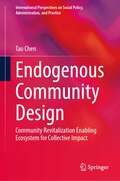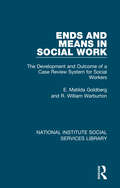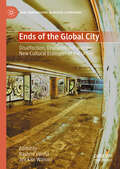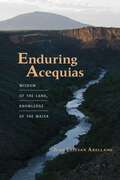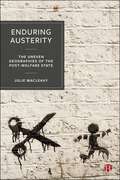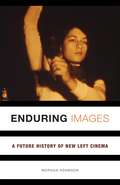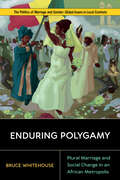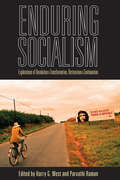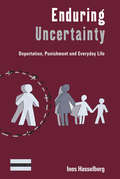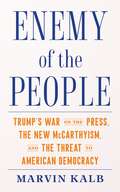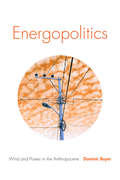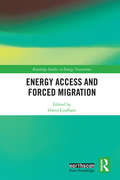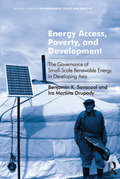- Table View
- List View
Endnotes: An Intimate Look at the End of Life
by Ray Ruth E.Part memoir, part biography, Endnotes explores how people construct meaning through their interactions with others.
Endnotes: An Intimate Look at the End of Life (End-of-Life Care: A Series)
by Ruth RayIn the summer of 1996, Ruth Ray, a gerontologist in her forties, befriended an eighty-two-year-old man suffering from Parkinson's. The two remained close until the end of his life, sharing stories and memories while building a deep relationship. Part memoir, part biography, Endnotes explores how people construct meaning through their interactions with others. With grace and wit, Ray situates her friend's past experiences and present relationships within the theories and literature of gerontology, providing a deeper understanding of autonomy at the end of life. She also delves into the complexities of sexuality and intimacy in old age, communication across disabilities and age groups, the disabling nature of nursing homes, and the trials of death and dying. Writing as both a woman and a gerontologist, Ray finds that the "quality of care" we provide for others requires not only an understanding of the relationships that have given a person's life meaning but also a willingness to accept and share deeply in the emotional process of physical and mental decline.
Endogenous Community Design: Community Revitalization Enabling Ecosystem for Collective Impact (International Perspectives on Social Policy, Administration, and Practice)
by Tao ChenThis book is a comprehensive exploration of endogenous community building, aiming to investigate how to create a vibrant, service-integrated, and sustainable community through collective impact approaches. It’s a guide to social innovation that combines theory and practical application. In terms of theory, it constructs concepts such as endogenous community, endogenous design system, life project platform and enabling ecosystem. In practice, it offers design methods and a toolkit for collective impact to enhance community resilience and capacity through service co-creation. This book provides readers with a systematic guide to endogenous community design, ranging from conceptual understanding and theoretical models to practical methodologies. Its aim is to build a sociotechnical system from the bottom-up to address complex issues.This book is ideal for community leaders, government officials, NGOs, urban planners, social innovators, and anyone passionate about sustainable community development.
Ends and Means in Policing (Routledge Innovations in Policing)
by John KleinigPolicing is a highly pragmatic occupation. It is designed to achieve the important social ends of peacekeeping and public safety, and is empowered to do so using means that are ordinarily seen as problematic; that is, the use of force, deception, and invasions of privacy, along with considerable discretion. It is often suggested that the ends of policing justify the use of otherwise problematic means, but do they? This book explores this question from a philosophical perspective. The relationship between ends and means has a long and contested history both in moral/practical reasoning and public policy. Looking at this history through the lens of policing, criminal justice philosopher John Kleinig explores the dialectic of ends and means (whether the ends justify the means, or whether the ends never justify the means) and offers a new, sharpened perspective on police ethics. After tracing the various ways in which ends and means may be construed, the book surveys a series of increasingly concrete issues, focusing especially on those that arise in policing contexts. The competing moral demands made by ends and means culminate in considerations of noble cause corruption, dirty hands theory, lesser degradations (such as tear gas, tasers, chokeholds, and so on), and finally, those means deemed impermissible by the majority in Western culture, such as torture.
Ends and Means in Social Work: The Development and Outcome of a Case Review System for Social Workers (National Institute Social Services Library)
by E. Matilda Goldberg R. William WarburtonOriginally published in 1979, Ends and Means in Social Work was the first book to provide research-based evidence on what social workers actually do, what they were aiming to achieve, and what sense their activities made, both in terms of their own subjective perspectives and those of their clients. The authors describe and analyse a series of surveys and action studies based on a year’s referrals and the long-term clientele of an area office. They aimed first to find out what the clients thought of and expected from the newly reorganised social services, and how social workers saw the changes and their new responsibilities. The second aim was to discover how social work skills and other resources were being used to meet different client needs. Third, the research was designed to enable social workers, by developing a new monitoring tool, the Case Review System, to become more explicit about both the ends and means of their activities. Widespread interest had been aroused by the Case Review System. It had raised intriguing questions about who gets what and why. On an individual level, the Case Review System can enable social workers to evaluate their practice by comparing plan with achievement; as an educational tool it can assist supervision; as a management tool it can provide aggregated data on client characteristics, the use of resources, and outcomes; as a research tool it can answer questions on the relationships between client characteristics, problems and social work practice, and provide longitudinal data on client careers. It is in response to insistent demands for a rounded account of this research project and its results that this book has been written. It endeavours to bring together all the aspects of the specific research studies and to discuss their wider implications for the organisation of the personal social services. Particularly valuable for students and practitioners alike will be the concluding discussion in which the evidence which emerged about the use of social work resources is subjected to critical review. Questions are raised about the current deployment of social work skills, and suggestions are made about how these skills might be redeployed, tasks defined more realistically, and how statutory functions could mesh more easily with voluntary activities.
Ends of Cinema (21st Century Studies)
by Richard Grusin Jocelyn Szczepaniak-GilleceAt the dawn of the digital era in the final decades of the twentieth century, film and media studies scholars grappled with the prospective end of what was deemed cinema: analog celluloid production, darkened public movie theaters, festival culture. The notion of the &“end of cinema&” had already been broached repeatedly over the course of the twentieth century—from the introduction of sound and color to the advent of television and video—and in Ends of Cinema, contributors reinvigorate this debate to contemplate the ends, as well as directions and new beginnings, of cinema in the twenty-first century.In this volume, scholars at the forefront of film and media studies interrogate multiple potential &“ends&” of cinema: its goals and spaces, its relationship to postcinema, its racial dynamics and environmental implications, and its theoretical and historical conclusions. Moving beyond the predictable question of digital versus analog, the scholars gathered here rely on critical theory and historical research to consider cinema alongside its media companions: television, the gallery space, digital media, and theatrical environments. Ends of Cinema underscores the shared project of film and media studies to open up what seems closed off, and to continually reinvent approaches that seem unresponsive. Contributors: Caetlin Benson-Allott, Georgetown U; James Leo Cahill, U of Toronto; Francesco Casetti, Yale U; Mary Ann Doane, U of California Berkeley; André Gaudreault, U de Montréal; Michael Boyce Gillespie, City College of New York; Mark Paul Meyer, EYE Filmmuseum; Jennifer Lynn Peterson, Woodbury U, Los Angeles; Amy Villarejo, Cornell U.
Ends of the Global City: Disaffection, Displacement and the New Cultural Ecologies of the Urban (New Comparisons in World Literature)
by Jini Kim Watson Rashmi VarmaThis volume of essays explores how the global city is confronting new forms of crises and disruption. Examining cities in the Caribbean, North America, Africa, the Persian Gulf, Asia and Australia, the essays use literary and cultural analysis to examine the pasts, present and futures of the global city. Ranging from the period of high postcolonial development, industrialization and compacted modernization to present-day neoliberal urban planning, the collection considers arrivals and departures in the global city, offering new critical vocabularies to analyse ongoing processes of migration, economic immiseration, and environmental collapse.
Enduring Acequias: Wisdom of the Land, Knowledge of the Water (Querencias Series)
by Juan Estevan ArellanoFor generations the Río Embudo watershed in northern New Mexico has been the home of Juan Estevan Arellano and his ancestors. From this unique perspective Arellano explores the ways people use water in dry places around the world. Touching on the Middle East, Europe, Mexico, and South America before circling back to New Mexico, Arellano makes a case for preserving the acequia irrigation system and calls for a future that respects the ecological limitations of the land.
Enduring Austerity: The Uneven Geographies of the Post-Welfare State
by Julie MacLeavyLooking at how austerity has become embedded in institutional practices, this book offers new critical insights into the uneven geographies created by austerity. Reflecting on the spatially and socially uneven impacts of austerity on individuals and families, Julie MacLeavy shows how the ‘new normal’ of post-welfare state governance will negatively condition life chances, even in better economic times. She considers the political, economic and social developments that have led us to the present moment and shows how the rhetoric of austerity has pushed social inequality and uneven development off the political agenda.
Enduring Cancer: Life, Death, and Diagnosis in Delhi (Critical Global Health: Evidence, Efficacy, Ethnography)
by Dwaipayan BanerjeeIn Enduring Cancer Dwaipayan Banerjee explores the efforts of Delhi's urban poor to create a livable life with cancer as patients and families negotiate an overextended health system unequipped to respond to the disease. Owing to long wait times, most urban poor cancer patients do not receive a diagnosis until it is too late to treat the disease effectively. Drawing on ethnographic fieldwork in the city's largest cancer care NGO and at India's premier public health hospital, Banerjee describes how, for these patients, a cancer diagnosis is often the latest and most serious in a long series of infrastructural failures. In the wake of these failures, Banerjee tracks how the disease then distributes itself across networks of social relations, testing these networks for strength and vulnerability. Banerjee demonstrates how living with and alongside cancer is to be newly awakened to the fragility of social ties, some already made brittle by past histories, and others that are retested for their capacity to support.
Enduring Images: A Future History of New Left Cinema
by Morgan AdamsonAn integrated look at the political films of the 1960s and &’70s and how the New Left transformed cinema A timely reassessment of political film culture in the 1960s and &’70s, Enduring Images examines international cinematic movements of the New Left in light of sweeping cultural and economic changes of that era. Looking at new forms of cinematic resistance—including detailed readings of particular films, collectives, and movements—Morgan Adamson makes a case for cinema&’s centrality to the global New Left. Enduring Images details how student, labor, anti-imperialist, Black Power, and second-wave feminist movements broke with auteur cinema and sought to forge local and international solidarities by producing political essay films, generating new ways of being and thinking in common. Adamson produces a comparative and theoretical account of New Left cinema that engages with discussions of work, debt, information, and resistance. Enduring Images argues that the cinemas of the New Left are sites to examine, through the lens of struggle, the reshaping of global capitalism during the pivotal moment in which they were made, while at the same time exploring how these movements endure in contemporary culture and politics. Including in-depth discussions of Third Cinema in Argentina, feminist cinema in Italy, Newsreel movements in the United States, and cybernetics in early video, Enduring Images is an essential examination of the political films of the 1960s and &’70s.
Enduring Polygamy: Plural Marriage and Social Change in an African Metropolis (Politics of Marriage and Gender: Global Issues in Local Contexts)
by Bruce WhitehouseWhy hasn’t polygamous marriage died out in African cities, as experts once expected it would? Enduring Polygamy considers this question in one of Africa’s fastest-growing cities: Bamako, the capital of Mali, where one in four wives is in a polygamous marriage. Using polygamy as a lens through which to survey sweeping changes in urban life, it offers ethnographic and demographic insights into the customs, gender norms and hierarchies, kinship structures, and laws affecting marriage, and situates polygamy within structures of inequality that shape marital options, especially for young Malian women. Through an approach of cultural relativism, the book offers an open-minded but unflinching perspective on a contested form of marriage. Without shying away from questions of patriarchy and women’s oppression, it presents polygamy from the everyday vantage points of Bamako residents themselves, allowing readers to make informed judgments about it and to appreciate the full spectrum of human cultural diversity.
Enduring Socialism: Explorations of Revolution and Transformation, Restoration and Continuation (Berghahn Ser.)
by Harry G. West Parvathi RamanAgainst the historical backdrop of successive socialist and post-socialist claims to have completely remade society, the contributors to this volume explore the complex and often paradoxical continuities between diverse post-socialist presents and their corresponding socialist and pre-socialist pasts. The chapters focus on ways in which: pre-socialist economic, political, and cultural forms in fact endured an era of socialism and have found new life in the post-socialist present, notwithstanding revolutionary socialist claims; continuities with a pre-socialist past have been produced within the historical imaginary of post-socialism; and socialist economic, political, and cultural forms have in fact endured in a purportedly postsocialist era, despite the claims of neo-liberal reformers.
Enduring Truths: Sojourner's Shadows and Substance
by Darcy Grimaldo GrigsbyRunaway slave Sojourner Truth gained fame in the nineteenth century as an abolitionist, feminist, and orator and earned a living partly by selling photographic carte de visite portraits of herself at lectures and by mail. Cartes de visite, similar in format to calling cards, were relatively inexpensive collectibles that quickly became a new mode of mass communication. Despite being illiterate, Truth copyrighted her photographs in her name and added the caption “I Sell the Shadow to Support the Substance. Sojourner Truth.” Featuring the largest collection of Truth’s photographs ever published, Enduring Truths is the first book to explore how she used her image, the press, the postal service, and copyright laws to support her activism and herself. Darcy Grimaldo Grigsby establishes a range of important contexts for Truth’s portraits, including the strategic role of photography and copyright for an illiterate former slave; the shared politics of Truth’s cartes de visite and federal banknotes, which were both created to fund the Union cause; and the ways that photochemical limitations complicated the portrayal of different skin tones. Insightful and powerful, Enduring Truths shows how Truth made her photographic portrait worth money in order to end slavery—and also became the strategic author of her public self.
Enduring Uncertainty: Deportation, Punishment and Everyday Life (Dislocations #17)
by Ines HasselbergFocusing on the lived experience of immigration policy and processes, this volume provides fascinating insights into the deportation process as it is felt and understood by those subjected to it. The author presents a rich and innovative ethnography of deportation and deportability experienced by migrants convicted of criminal offenses in England and Wales. The unique perspectives developed here – on due process in immigration appeals, migrant surveillance and control, social relations and sense of self, and compliance and resistance – are important for broader understandings of border control policy and human rights.
Enduring Violence: Ladina Women's Lives in Guatemala
by Cecilia MenjívarDrawing on revealing, in-depth interviews, Cecilia Menjívar investigates the role that violence plays in the lives of Ladina women in eastern Guatemala, a little-visited and little-studied region. While much has been written on the subject of political violence in Guatemala, Menjívar turns to a different form of suffering--the violence embedded in institutions and in everyday life so familiar and routine that it is often not recognized as such. Rather than painting Guatemala (or even Latin America) as having a cultural propensity for normalizing and accepting violence, Menjívar aims to develop an approach to examining structures of violence--profound inequality, exploitation and poverty, and gender ideologies that position women in vulnerable situations-- grounded in women's experiences. In this way, her study provides a glimpse into the root causes of the increasing wave of feminicide in Guatemala, as well as in other Latin American countries, and offers observations relevant for understanding violence against women around the world today.
Endö Shüsaku: A Literature of Reconciliation (Nissan Institute/Routledge Japanese Studies)
by Mark B. WilliamsEndö Shüsaka is probably the most widely translated of all Japanese authors. In this first major study of Endö's works, Mark Williams moves the discussion on from the well-worn depictions of Endö as the 'Japanese Graham Greene', and places him in his own political and cultural context.
Enemies
by Bill GertzIn the stunning "New York Times" bestseller "Treachery," Bill Gertz blows the lid off the dirty dealings of our so-called allies. Gertz's groundbreaking reporting exposes how France, Germany, Russia, and other "friends" of the United States have armed the world's most dangerous tyrants and terrorists--"putting Americans directly in the line of fire," And in a brand-new chapter based on classified intelligence reports, Gertz documents how the treachery continues unchecked. Plus, for the first time ever, he reveals the complete story on what happened to Saddam Hussein's weapons--a shocking account that will change the way you look at the dangers in the Middle East.
Enemies Within: The Culture of Conspiracy in Modern America
by Robert Alan Goldberg"There is a hunger for conspiracy news in America. Hundreds of Internet websites, magazines, newsletters, even entire publishing houses, disseminate information on invisible enemies and their secret activities, subversions, and coverups. Those who suspect conspiracies behind events in the news - the crash of TWA Flight 800, the death of Marilyn Monroe - join generations of Americans, from the colonial period to the present day, who have entertained visions of vast plots. In this book Robert Goldberg focuses on five major conspiracy theories of the past half-century, examining how they became widely popular in the United States and why they have remained so. "--BOOK JACKET. Title Summary field provided by Blackwell North America, Inc. All Rights Reserved
Enemies to Allies: Cold War Germany and American Memory (Studies In Conflict, Diplomacy, And Peace Ser.)
by Brian C. Etheridge“Addresses a compelling and fascinating feature of the Cold War Era, namely the rapid reversal of America’s alliance relationships after World War II.” —Thomas A. Schwartz, coeditor of The Strained AllianceAt the close of World War II, the United States went from being allied with the Soviet Union against Germany to alignment with the Germans against the Soviet Union—almost overnight. While many Americans came to perceive the German people as democrats standing firm with their Western allies on the front lines of the Cold War, others were wary of a renewed Third Reich and viewed all Germans as nascent Nazis bent on world domination. These adversarial perspectives added measurably to the atmosphere of fear and distrust that defined the Cold War.In Enemies to Allies, Brian C. Etheridge examines more than one hundred years of American interpretations and representations of Germany. With a particular focus on the postwar period, he demonstrates how a wide array of actors—including special interest groups and US and West German policymakers—employed powerful narratives to influence public opinion and achieve their foreign policy objectives. Etheridge also analyses bestselling books, popular television shows such as Hogan’s Heroes, and award-winning movies such as Schindler’s List to reveal how narratives about the Third Reich and Cold War Germany were manufactured, contested, and co-opted as rival viewpoints competed for legitimacy.This groundbreaking study draws from theories of public memory and public diplomacy to demonstrate how conflicting US accounts of German history serve as a window for understanding not only American identity, but international relations and state power.“A masterful combination of diplomatic and cultural history.” —Stewart Anderson, Brigham Young University
Enemy of the People: Trump's War on the Press, the New McCarthyism, and the Threat to American Democracy
by Marvin Kalb[from inside flaps] ""The FAKE NEWS media is not my enemy, it is the enemy of the American People!" President Trump tweeted this declaration less than a month after his inauguration. Attacks on the media have been a hallmark of his presidential campaign and style of governance. This represents a dangerous and dramatic turning point. Twentieth-century dictators--Stalin, Hitler, and Mao--all denounced their critics, especially the press, as "enemies of the people." Their goal was to delegitimize the work of the press--effectively calling it "fake news," thereby creating confusion in the public's mind about what's real and what isn't, what can be trusted and what can't be. This also appears to be Trump's goal. In Enemy of the People, Marvin Kalb, an award-winning American journalist, writes with passion about his concerns for the future of American democracy. Can it withstand Trump's unrelenting attacks on the press? As Kalb shows, the press has been a bulwark of American democracy. He writes about Edward R. Murrow's courageous broadcasts that turned the cold light of reality on Senator Joseph McCarthy's "Red Scare" threats in the early 1950s. He also vividly reminds us of Bob Woodward and Carl Bernstein's reporting during the Watergate scandal, which led to President Richard Nixon's resignation. Without a fearless, robust press, democracy is in peril. Kalb's book is an eye-opening indictment of President Trump's efforts to debase and dehumanize the American media--and put the future of America's democracy in question."
Energie-Weltatlas: Transformation des Energiesystems in globaler Perspektive
by Matthias Schmidt Stephan Bosch Friederike Schlenker Jochen Bohn Simone KupiesSehr anschauliche kartographische Visualisierungen, nationale Steckbriefe zu den Energiesystemen, globaler Überblick und das Buch ermöglicht Vergleiche.
Energopolitics: Wind and Power in the Anthropocene
by Dominic BoyerBetween 2009 and 2013 Cymene Howe and Dominic Boyer conducted fieldwork in Mexico's Isthmus of Tehuantepec to examine the political, social, and ecological dimensions of moving from fossil fuels to wind power. Their work manifested itself as a new ethnographic form: the duograph—a combination of two single-authored books that draw on shared fieldsites, archives, and encounters that can be productively read together, yet can also stand alone in their analytic ambitions. In his volume, Energopolitics, Boyer examines the politics of wind power and how it is shaped by myriad factors, from the legacies of settler colonialism and indigenous resistance to state bureaucracy and corporate investment. Drawing on interviews with activists, campesinos, engineers, bureaucrats, politicians, and bankers, Boyer outlines the fundamental impact of energy and fuel on political power. Boyer also demonstrates how large conceptual frameworks cannot adequately explain the fraught and uniquely complicated conditions on the isthmus, illustrating the need to resist narratives of anthropocenic universalism and to attend to local particularities.
Energy Access and Forced Migration (Routledge Studies in Energy Transitions)
by Owen GrafhamThis edited collection brings together a selection of expert authors and draws on a wide range of case studies, geographies, and perspectives to explore the links between forced migration and energy access. This book addresses the paucity of academic study on how energy is delivered to the millions of people currently forcibly displaced. The contributions throughout assess the current energy governance regimes, models of delivery, and innovative solutions that are dictating how energy is – and can be – provided to those who have been forced to move away from their homes. By bringing together author-teams of practitioners, academics, businesses, and policy makers, this collection encourages interdisciplinary dialogue about the best way of approaching energy provision for the forcibly displaced. This book will be of great interest to students and scholars of energy access and policy, environmental justice and equity, and migration and refugee studies.
Energy Access, Poverty, and Development: The Governance of Small-Scale Renewable Energy in Developing Asia (Routledge Studies in Environmental Policy and Practice)
by Benjamin K. Sovacool Ira Martina DrupadyThis book showcases how small-scale renewable energy technologies such as solar panels, cookstoves, biogas digesters, microhydro units, and wind turbines are helping Asia respond to a daunting set of energy governance challenges. Using extensive original research this book offers a compendium of the most interesting renewable energy case studies over the last ten years from one of the most diverse regions in the world. Through an in-depth exploration of case studies in Bangladesh, China, India, Laos, Indonesia, Malaysia, Mongolia, Nepal, Papua New Guinea, and Sri Lanka, the authors highlight the applicability of different approaches and technologies and illuminates how household and commercial innovations occur (or fail to occur) within particular energy governance regimes. It also, uniquely, explores successful case studies alongside failures or "worst practice" examples that are often just as revealing as those that met their targets. Based on these successes and failures, the book presents twelve salient lessons for policymakers and practitioners wishing to expand energy access and raise standards of living in some of the world's poorest communities. It also develops an innovative framework consisting of 42 distinct factors that explain why some energy development interventions accomplish all of their goals while others languish to achieve any.

